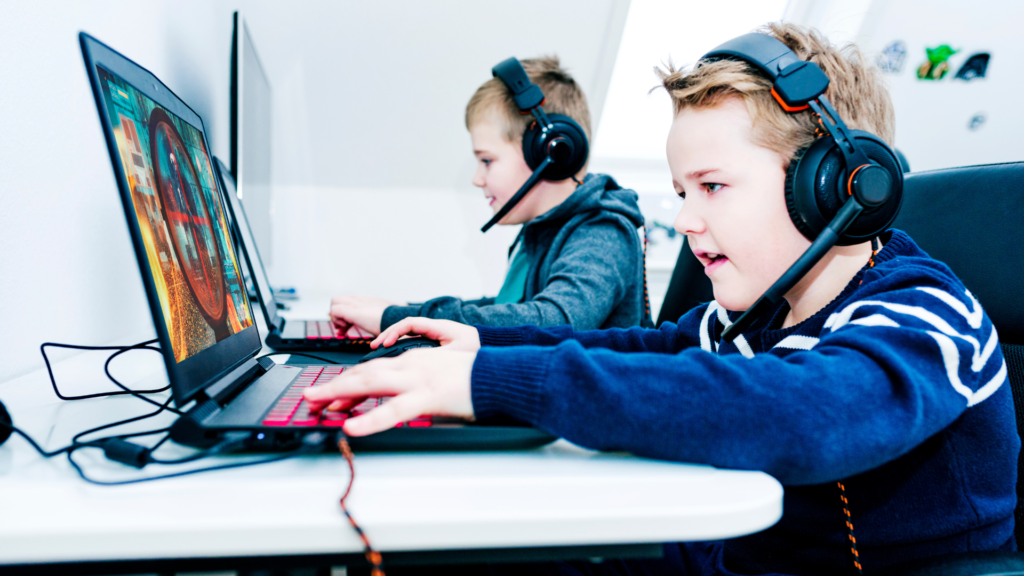Are you a parent or guardian of children who love to game? Video games have come a long way since their introduction and the majority of them are quite safe for young players. But how can you ensure that your kids stay safe while gaming?
In this article, we’ll look at what parents need to know about young players and video games so that they can keep their kids safe and secure when playing.
Benefits of Gaming for Young Players
There are a lot of benefits to gaming for young players. It can help them develop social skills, hand-eye coordination, problem-solving skills, and even creative thinking. For instance, playing online chess can enhance strategic thinking and improve concentration, potentially offering a unique way for kids to practice these skills in a structured environment. In addition, it can be a great way for them to relieve stress and have fun.
Other engaging options include games like Minecraft, which fosters creativity and teamwork, or educational apps that combine learning with interactive play. However, kids should be supervised while they play in order to deter them from consuming too much screen time. That is why it’s important for parents to be aware of what their kids are doing when they are gaming and to make sure they’re staying safe.
Risks and Dangers of Gaming for Young Players
There are many risks and dangers associated with gaming for young players. These include physical risks such as repetitive strain injuries, as well as social risks including becoming isolated from friends and family.
Physical risks can be minimized by ensuring that young players take regular breaks from gaming, and by using ergonomic controllers and accessories. Also, social risks can be lessened by maintaining a healthy balance between gaming and other activities.
It is always crucial to be aware of the risks associated with gaming, and take steps to reduce them. By doing so, they can ensure that their children enjoy gaming safely and healthily.
Tips for Parents to Help Keep Their Kids Safe While Playing Games
It can be difficult to know how to keep your kids safe while they are playing video games. Here are some tips to secure them while playing games:
- Monitor their play
- Encourage positive gaming habits
- Teach them about online safety
It is always best to use parental controls on devices and computers to help limit their access to inappropriate content and websites. By following these tips, you can help keep your kids safe while they enjoy playing video games.
Parental Controls on Popular Video Game Systems
Several popular video game systems offer parental controls. Xbox One offers similar features to PlayStation 4, but also allows parents to set content restrictions based on ratings. Additionally, PC gaming platforms such as Steam also offer parental controls.
Steam’s family view feature allows parents to set up accounts for their children and customize what games they can see and access. They can also limit the amount of time their children can spend playing games on Steam.
Identify Online Friends and Detect Suspicious Activities
Parents often grapple with a significant worry: understanding the nature of their children’s interactions in the virtual gaming world. The realm of online gaming can sometimes expose children to improper behaviors, unsuitable individuals, or even potential threats. This is where the invaluable role of people tracing services available at BondRees.com and similar platforms can come into play, meticulously overseeing digital communications.
These specialized services can have the capability to alert parents about any peculiar or suspicious occurrences within the gaming communities their children are a part of. This encompasses activities such as aggressive language, unconventional actions, or discussions that raise concern. By equipping parents with a mechanism to swiftly spot potential issues, these services empower parents to step in, address the matter, and initiate necessary actions to ensure the safety and well-being of their children.
Online Safety Guidelines for Parents and Kids
It is critical to know what your child is playing. Take some time to familiarize yourself with the game, its content, and how it is played. This will help you better understand what your child is doing while they’re gaming, and give you a better idea of any potential risks involved.
Just like with TV or other screen-based media, you have to set limits on how much time your child can spend playing video games. Furthermore, too much screen time can lead to problems with focus and attention, as well as an increased risk for obesity and other health problems.
If your child is into online multiplayer games, be mindful of the potential risks associated with chat features and in-game messaging systems. Predatory adults have been known to use these platforms to groom children for sexual exploitation, so it is important to monitor your child.
Additionally, too much online activity could also increase the risk of having data leaked. It’s important to prioritize application security and also educate your child on the potential dangers associated with a strong online presence.
Further, gamers can be prone to malicious attacks, causing delays in their game or stealth of their login credentials. To avoid such mishaps, you can encourage your child to use two-factor authentication systems along with VPNs (Virtual Private Networks).
If you are wondering, “can vpns be tracked by hackers?” you need to understand that VPNs with small server bases are usually vulnerable to this. Therefore, those with larger bases are less likely to be exploited and can provide you the security that you and you kids need.
The Impact of Social Media on Youth Gaming Habits
The impact of social media on youth gaming habits is two-fold. Additionally, it can be a positive force, connecting kids with friends who share their interests. On the negative side, it exposes kids to inappropriate content or leads them to develop unhealthy gaming habits.
As a parent, keep in mind to be aware of both the positives and negatives of social media when it comes to your child’s gaming habits. To help your kids have a good experience with social media and gaming, be certain to monitor their activity.
Encourage them to communicate with you about any concerns they have, and talk to them about possible harm related to online gaming. Finally, make sure that any games or apps they are using are appropriate for their age group.

